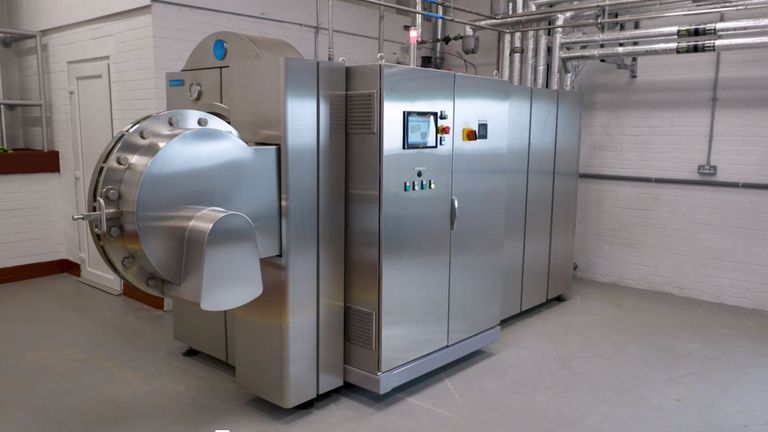In a move aimed at revolutionising the way we say goodbye to loved ones, Co-op Funeralcare is pioneering the introduction of resomation – also known as alkaline hydrolysis or water cremation – in the UK later this year.
The Co-op Group says this will mark the first major shift in UK funerals for more than 120 years, as the first alternative to burial or cremation since the introduction of the Cremation Act of 1902.
Resomation speeds up the natural process associated with burial, enclosing the deceased in a biodegradable pouch and placing them in a container filled with pressurised water and a small amount of potassium hydroxide. Each cycle takes approximately four hours. At the end of the cycle, the soft bones which are left are dried, then reduced to a white powder, similar to ash. The remains are then returned to relatives in a sustainable urn.

Resomation – taken from the Greek word meaning return of the human body – is already available in nearly 30 states in America. It is also permitted in Canada and South Africa, and could also be made available in Ireland this year. Following his death at the end of 2021, anti-apartheid campaigner Archbishop Desmond Tutu chose the process for his funeral.
Co-op Funeralcare, which arranges over 93,000 funerals a year, believes that with 80% of families opting for cremation, it is time that alternative committal methods such as resomation are looked at as a mainstream option for UK funerals. The government has been updated on plans to make resomation available and questions on new methods were also raised at the Synod of Church of England earlier this year.
As part of its wider commitment to ‘co-operating for a fairer world’, the Group says there is a need for all industries, including the funeral sector to address the climate crisis.
“For decades there have been just two main choices when it comes to end-of-life arrangements: burial and cremation,” says Julian Atkinson, director of resomation service Kindly Earth. “By starting to make resomation available in the UK, Co-op will be providing people with another option for how they leave this world because this natural process uses water, not fire, making it gentler on the body and kinder on the environment.
“Throughout the 30 years I have been involved in the funeral industry, I have always been passionate about people having access to more sustainable end of life arrangements, and we are encouraged to see that many members of the public are conscious of reducing the carbon footprint, even after death.”
International research suggests that resomation is a more sustainable option than gas cremation. The Group and providers of resomation will be working with sustainability experts and academics to further validate and understand these claims through an initial pilot.
Cremation grew in popularity throughout the 20th century and overtook burial in the 1960s as the preferred method of disposal of bodies after death.
“The rise in ecological and sustainability concerns over the past decade, combined with a desire to be part of nature or laid to rest in a natural setting, means more people are considering the environmental impact of their body once they die,” says anthropologist, theologian and expert in death rites, cremation and woodland burial, Professor Douglas Davies from the department of theology and religion, Durham University.
“The reduced carbon footprint that may come with resomation compared with other forms of body disposal, means it will no doubt be of interest to many people as the practice is increasingly made available in the UK.”
Gill Stewart, MD of Co-op Funeralcare, added: “Our priority is to help families create a funeral that is personal every step of the way, and as the leading provider of funerals in the UK introducing innovative and sustainable options for our clients is an absolute priority.
“Up until now choice has been limited to burial or cremation. We’ve seen from the rapid uptake of newer funeral options such as direct cremation, that when choice in the funeral market is broadened, this is only a positive thing both for the bereaved and for those planning ahead for their own farewell.”